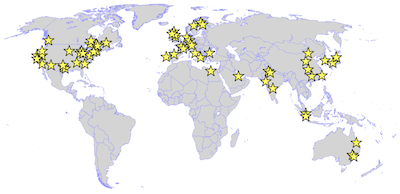| Version 25 (modified by murphpo, 11 years ago) (diff) |
|---|
About the WARP Project
 The Wireless Open-Access Research Platform (WARP) is a scalable and extensible programmable wireless platform, built from the ground up to prototype advanced wireless networks. WARP combines high-performance programmable hardware with an open-source repository of reference designs and support materials.
The Wireless Open-Access Research Platform (WARP) is a scalable and extensible programmable wireless platform, built from the ground up to prototype advanced wireless networks. WARP combines high-performance programmable hardware with an open-source repository of reference designs and support materials.
The WARP Project was founded in 2006 by Prof. Ashu Sabharwal at Rice University. The project was originally funded by the National Science Foundation. The project has since grown into a self-sustaining open-source effort with users around the world.
Mango Communications spun off from the Rice WARP Project in 2008 with the initial goal of manufacturing and distributing the Rice WARP hardware. In 2012 Mango released the entirely re-designed WARP v3 hardware. Today Mango engineers are the most active contributors to the WARP repository and forums, providing ongoing development of the open-source WARP designs and support for the WARP community.
Research Impact
WARP has been adopted by hundreds of researchers worldwide. The platform has been used for cutting-edge research on a wide of topics, including full-duplex wireless, cooperative communications, localization and multi-user MIMO. The pace of adoption continues to accelerate.
We have highlighted a number of projects enabled by WARP. If you have a project we should add to this list, please email us (info[at]warpproject.org).
Please visit the list of papers published by WARP users, and Google Scholar's list of papers citing WARP.
Education Impact
Many students learning digital communication never get to see a real wireless link in a lab. Many courses only address the theory of baseband processing or higher layer protocol design. WARP has proven an excellent means to fill this gap for undergraduate and graduate education labs. The open-source WARPLab and OFDM/CSMA Reference Designs are ideal starting points for introducing students to real-world physical layer processing and protocol development.
A number of universities have already adopted WARP for use in their courses, including:
- Rice University ELEC 433: Digital Communications Lab
- Southern Methodist University EE8391: Embedded Wireless Protocol Design Lab
- ECET-512: Wireless Systems
More Information
To learn more about the project, please visit the WARP Repository or email the project developers at info[at]warpproject.org.

